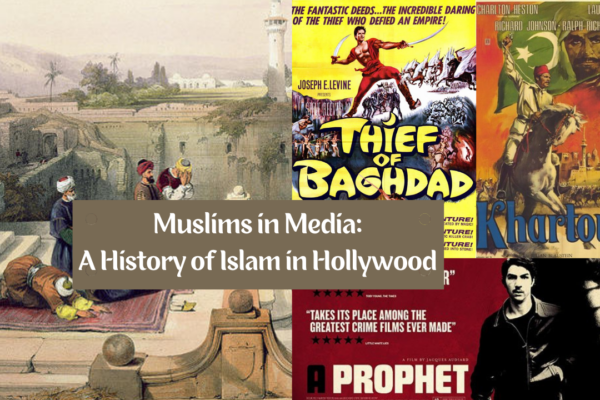On this week’s TMV Podcast, I spoke to Shaf, a co-founder of The Riz Test, on how his project came to be, the need for more Muslim representation in film and television, and the surprising number of films and television shows that fails in terms of accurately portraying Muslims onscreen.
On this week’s TMV Podcast, I spoke to Shaf, a co-founder of The Riz Test, on how his project came to be, the need for more Muslim representation in film and television, and the surprising number of films and television shows that fails in terms of accurately portraying Muslims onscreen.
On this week’s TMV Podcast, I spoke to Shaf, a co-founder of The Riz Test, on how his project came to be, the need for more Muslim representation in film and television, and the surprising number of films and television shows that fails in terms of accurately portraying Muslims onscreen.
Listen to our full discussion here:
The Riz Test, taking their name from British-Muslim actor Riz Ahmed, took inspiration from Riz Ahmed’s now famous speech at the House of Commons in 2017, where he made an urgent appeal for the need of more representation on screen for minorities and those who have been historically misrepresented.
Modeling themselves after the Bechdel Test, which tests for accurate female representation in film and television, the Riz Test came about with the idea that there should be a quantifiable way of collecting data on Muslim representation onscreen. The Riz Test then came up with five criteria that the movie or show had to cover in order to pass the Riz Test.
The Test
If the film/show stars at least one character who is identifiably Muslim (by ethnicity, language or clothing) – is the character…
- Talking about, the victim of, or the perpetrator of terrorism?
- Presented as irrationally angry?
- Presented as superstitious, culturally backwards or anti-modern?
- Presented as a threat to a Western way of life?
- If the character is male, is he presented as misogynistic? or if female, is she presented as oppressed by her male counterparts?
If the answer for any of the above is Yes, then the Film/ TV Show fails the test.
Shaf explains that these five criteria revolve around three common themes that so many of the movies and television shows that portrayed a Muslim in it have: terror, culture, and gender. Wanting a way to collect data on movies using these criteria, Shaf helped launch the Riz Test to be able to keep track of what really is happening in pop culture when it comes to Islamophobia.
“Islamophobia is not just a Muslim problem, its a societal problem. The Riz Test is just a way of measuring this Islamophobia in films, as we’ve never quantified this data before”.
Shaf
The need for more Muslim representation in film and television is at the heart of Shaf’s call for more awareness surrounding projects like the Riz Test. Far too often, as many of us have seen, a film or television show has the mass appeal or box-office ratings but ruins it for may Muslims after a problematic “Muslim” character is portrayed as a terrorist, vulnerable woman, or played alongside a “backwards” seeming culture. If there was support for both offscreen, as well as onscreen, representation of Muslims, there would arguably be much less of a mass misrepresentation of ordinary Muslims.
That, in part, is what Shaf believes is in desperate need of the most: the need for films and television to show ordinary Muslims, who are characters with their own complexities and uniqueness but just happen to be Muslim. While some television shows such as Office Space, Oz, and Community all, in fact, pass the Riz Test with their portrayal of ordinary characters who happen to be Muslim, it becomes much more problematic when bigger box-office hits promote Islamophobia in often subtle and manipulative ways.
“Iron Man can be imagined, but what can’t be imagined is just a normal Muslim. We just want to genuinely affect change in the industry”.
Back to the Future, a much-beloved classic film, surprisingly fails the Riz Test because of the opening screen in where “Libyan terrorists” shoot dead Doc Brown. Black Panther, although Shaf says he still does love the movie, fails the Riz Test because of its portrayal of Muslim “terrorists” who kidnapped innocent girls (who later rip off their hijabs in an act of “freedom”). Popular TV shows, such as In the Line of Duty and Informer, both of which were immensely popular, all fail the Riz Test because of their problematic portrayal of Muslims. The best example of the worst type of Islamophobic TV show is Bodyguard according to Shaf, who explained that within the first 12 minutes of the very first episode it broke all five criteria of the Riz Test. What makes this especially worrying is how popular this TV show has become, with more than 10.7 million views for the final episode.
“There is no one type of Muslim, and not every Muslim onscreen has to be a superhero. The Riz Test wants human representation on screen”.
Although much of this can be disheartening, Shaf insists that his love for film and television will not be dampened by much of the Islamophobia we see onscreen. With more awareness around projects like the Riz Test, Shaf hopes that we can collectively begin to change the film industry. The Riz Test has already been contacted by major production houses for consultation, and with the backing of Riz Ahmed himself and other celebrities, Shaf hopes that real change is on the horizon.
To get in touch, follow their Twitter account or email them at hello@riztest.com. You can also submit a review for a movie that either fails or passes the Riz Test on their website.





